American View
Feature
What’s Changed in the Jewish World After #MeToo?
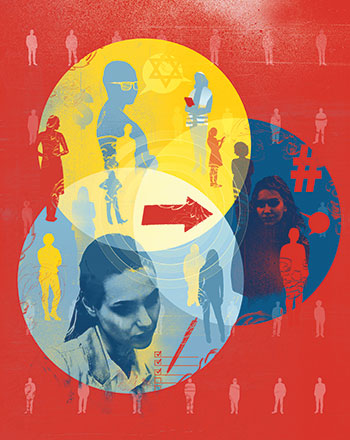
Much has changed, in the Jewish world and in the United States in general, since two New York Times reporters broke the story in October 2017 of Hollywood producer Harvey Weinstein’s alleged sexual abuse of actresses hoping for roles in his films.
And so much has not.
The flood of #MeToo allegations that emerged after the Weinstein revelations has also led to some unanticipated consequences amid the ambiguities of resulting shifts in organizational policy and behavioral expectations. There has been a major cultural transformation, with women now more comfortable naming men who have abused their power in the workplace and companies now working to put more effective anti-sexual harassment and assault policies in place.
But the change is far from complete, and while there is a consensus that sexual assault must be stamped out and addressed, questions of what defines and how to investigate and prevent workplace harassment remain: Is every coarse comment made in a workplace sexual harassment? Is a man putting his hands on the shoulders or waist of a woman or hugging her without asking consent considered sexual misconduct? Where should the line be drawn between innocuous, if insensitive, and truly unacceptable behavior?
Another new element is the anger women are now voicing after years of being harassed and physically assaulted in their work environments, and sometimes punished if they dared to complain about it.
It was that kind of anger that Lisa Goldman felt when she read the New York Jewish Week’s July 2018 exposé of sexual harassment allegations against the prominent Jewish sociologist Steven M. Cohen. Seeing the claims—first made by American studies historian Keren McGinity—against Cohen “set something loose” in her, said Goldman.
Her own experience with Cohen came rushing back into her consciousness.
Goldman, now a 52-year-old freelance journalist and editor in Montreal, had asked Cohen, an acquaintance, to assist her with a fellowship application in 2016. Cohen suggested they meet at a restaurant in Manhattan’s West Village, Goldman recalled, not far from Hebrew Union College-Jewish Institute of Religion, the Reform movement seminary where he worked as a professor.
Cohen, now 69, had directed dozens of national and local Jewish population studies, and authored innumerable articles and books. Over a 45-year career, he had become a pre-eminent expert on American Jewish behavior and beliefs.
When Goldman arrived at the restaurant, she recounted, Cohen was concluding a meeting with a male student, who sat across from him. Cohen indicated that Goldman should sit on the banquette next to him. Once the male student left, Cohen put his hand on her thigh, Goldman said in an interview with Hadassah Magazine, speaking publicly about the incident for the first time.
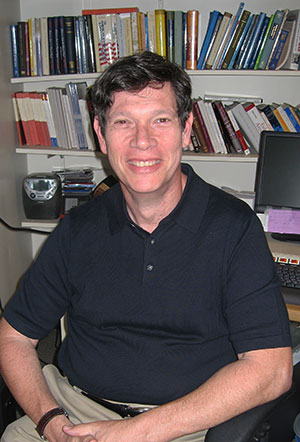
When she ended the meeting as quickly as possible, he asked where she was headed and walked with her toward the subway, according to Goldman. When they reached his subway station, he pivoted and kissed her hard on the mouth before rushing down the stairs, she said.
“I heard ringing in my ears and was really, really pissed off,” Goldman recalled. At the same time, she wondered: “At what point do I get to talk to a man in a professional context and not be made to feel uncomfortable?” She said that “as a result of a lifetime of conditioning, I said nothing” to him in the moment but “decided on the spot not to pursue that fellowship because I didn’t want to ever have to deal with him again.”
This incident was far from the worst sexual misconduct Goldman has experienced, she said. “I’ve been mauled by a colleague at an office party of a major Israeli newspaper” and verbally and physically harassed on Israeli buses and New York subways. While on assignment in Cairo’s Tahrir Square and in India, she was grabbed, touched and spat at, she said. She also contends that she lost two jobs as a direct result of complaining about sexual harassment.
Last year, after The Jewish Week published the allegations against Cohen—made by seven women after the initial accusation by McGinity, who currently teaches at Hebrew College in Newton, Mass., and serves on the Sexual Misconduct Task Force of the Association for Jewish Studies—HUC-JIR began investigating. Cohen resigned from his position as professor of social policy research there and as director of the Berman Jewish Policy Archive, an electronic database of studies about American Jewish behavior and attitudes housed at Stanford University.
In an interview with Hadassah Magazine, Cohen expressed remorse for his actions. While he declined to comment on any individual incident, he said, “I take very seriously what women have said about the pattern of my inappropriate behavior. I am deeply committed to changing that behavior, to be someone who acts totally in accord with the great respect I have for women.
“Over the past year,” he continued, “with the help of my therapist, conversations with several rabbis and my wife, I’ve engaged in introspection and reflection, seeking to understand the roots of my behavior and how I hurt people, with the goal of ensuring that I never repeat such actions again.”
He added, “That is the essence of genuine teshuvah, a process that takes time.”
While the long-term work of transforming cultural norms has only recently begun, some concrete changes have already taken place in the Jewish world.
Catalyzed by the #MeToo movement, women—and a few men—working in and with Jewish groups have initiated efforts to counter sexual misconduct on multiple levels: providing places for victims to voice their experiences; conducting workplace trainings; compiling best practices; and advocating for stronger policies ranging from gender equity in hiring to developing better ways to handle allegations when they arise.
ALSO READ: “When Rabbis Say #MeToo” and “#GamAni: The #MeToo’s Impact in Israel”
The resulting projects are like a Venn diagram of overlapping people and initiatives, with shared goals at the center.
Over the last year, the Jewish Women’s Archive, for instance, has collected testimonies from some 100 women, said Judith Rosenbaum, the group’s executive director. The closed Facebook group #GamAni (Hebrew for #MeToo), with over 1,100 members from Israel and around the world, is a place where people share experiences and allegations.
The Jewish Women’s Archive was one of the early recipients of a grant from a coalition founded in early 2018 to formulate a long-term strategy on how to change policies and practices on a wide array of related issues. The Safety Respect Equity coalition—with an initial investment of $500,000 from heavyweight Jewish funders, including the Charles and Lynn Schusterman Family Foundation, the Harry and Jeanette Weinberg Foundation, the Jim Joseph Foundation and the Russell Berrie Foundation—recently announced a new round of grants totaling $1.3 million, with funding of $25,000 to $150,000 to 15 new and existing organizations focused on these issues.
The coalition also developed a set of principles for Jewish groups that would “adhere to high ethical and legal standards for prevention and response to sexual harassment and gender discrimination.” The coalition’s steering committee, which brings together 60 men and women who occupy mid-level to CEO positions in the Jewish communal world, has already gotten 100 organizations, from small family foundations to behemoths like Hillel International, to commit to the standards.
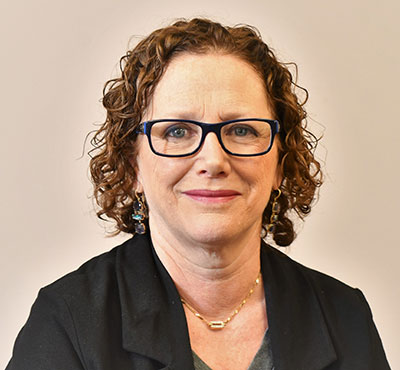
Hadassah, the Women’s Zionist Organization of America, is among the newest groups to sign the coalition’s pledge. Hadassah has also brought in an expert on workplace sexual harassment policies to train managers, lay leaders and employees twice annually for the past several years.
“Even before the #MeToo movement, Hadassah has always done anti-harassment training and been at the forefront of advocating for change” in how harassment is handled, said Rabbi Rebecca Sirbu, Hadassah’s director of the division of member and unit services, who is a founding member of the coalition’s steering committee.
Employment attorney Laura Sack has run Hadassah’s sexual harassment trainings for the past several years. “We’ll talk about what to do if an employee encounters inappropriate conduct, how to report it, supervisors’ responsibility for addressing harassment, the distinctions between what constitutes harassment as a matter of law and behavior inconsistent with Hadassah’s own policy,” she said. In the #MeToo era, “attention to these issues of preventing and addressing harassment in the workplace has been significantly heightened,” she added, noting that both New York State and New York City recently passed legislation mandating relevant employee training.
In addition to the Jewish Women’s Archive, another early coalition grantee was the Jewish Women’s Foundation of New York, which has partnered with the Good People Fund to create an initiative called Ta’amod: Stand Up. Ta’amod provides an array of resources, from articles and webinars to access to law firms and workplace sexual harassment and abuse training specifically for Jewish organizations and their culture—often more “huggy,” warm and family-like than corporate environments. Ta’amod spokesman Glenn Rosenkrantz said the group has provided respectful workplace training to about 75 organizations within the last year and a half.
Fran Sepler, an expert on workplace harassment who is president of her own Minneapolis-based firm focused on this issue, is Ta’amod’s lead trainer. The Equal Employment Opportunity Commission hired her years ago to create training that the federal agency now uses throughout the country.
Sexual assault and harassment begin with a workplace culture in which people are not treated with respect, Sepler said. “Sexual harassment is part of a continuum of behaviors, and incivility is a predictor of gender harassment. Bullying, too.”
Another coalition grantee that provides training is Sacred Spaces. The group was originally conceived in 2016, almost a year before #MeToo burst onto the public stage, to work toward ending child sexual abuse in the Jewish community. Since 2017, it has broadened its mission to provide crisis consultation and training to Jewish organizations around the issue of sexual harassment and assault between adults, said Shira Berkovits, the group’s founder.
The coalition also provided funds for Gender Equity in Hiring in the Jewish Community, a new initiative conceived by organizational consultant Sara Shapiro-Plevan and Sirbu. That program recently began offering daylong trainings on recognizing and rectifying gender bias in hiring. Their first three training sessions filled quickly with staff and leadership from Jewish day schools, federations and social justice organizations. They plan to run more in the fall, said Sirbu.
Some wonder if there is enough nuance in the #MeToo discussion. Are men who sometimes cross into women’s personal space and are too touchy—like Democratic presidential candidate and former Vice President Joe Biden, for example—being lumped together with men who sexually assault women and threaten them with professional repercussions?
Keren McGinity, who alleged that Steven M. Cohen had forced her against a wall and kissed her neck at a professional conference, agrees with those who think “we shouldn’t lump everyone together. It’s different for someone to do something once or twice, different for someone to say something or touch someone. Gradations matter.”
And questions are arising about how allegations play out even before they are investigated. For instance, then-Senator Al Franken, Democrat of Minnesota, resigned from office in December 2017 after eight women—some anonymous, some not—accused him of groping them. All of the alleged incidents happened before he was in public office, when he was a working comedian. After 32 senators, led by now-presidential candidate Kirsten Gillibrand, Democrat of New York, called for his resignation, Franken stepped down before any investigation.
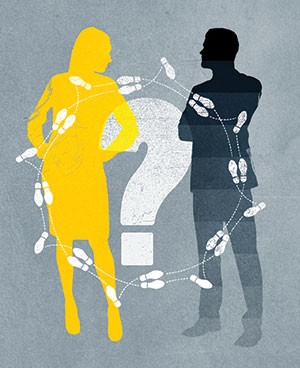
Some worry that women are abdicating their voices in these interactions. To be sure, when women are professionally dependent on the men who are demanding sex—as were the actresses allegedly threatened and/or raped by Harvey Weinstein—they are at a clear disadvantage in the power dynamic. But in other cases, where the dynamic is less lopsided, should women be expected to voice their rejection of come-ons or worse in the moment, or only complain about them later?
Bat Sheva Marcus, a clinical expert on women’s sexual health, former president of the Jewish Orthodox Feminist Alliance and a longtime advocate for women’s rights in Orthodox Judaism, said she fears the pendulum has swung too far.
“When women complain of harassment it’s important to take them seriously,” said Marcus, dubbed “the Orthodox sex guru” by The New York Times. It’s also important “to articulate different levels of harassment and expect women to stick up for themselves and speak to the harasser or the authorities.”
At the same time, she worries that when it comes to claims of sexual harassment or assault, “there’s no jury anymore,” Marcus said. The assumption has become “if you complain, then you must be right.”
She cited a case of a male friend working for a major technology company who was accused by a young female subordinate of making comments that made her uncomfortable. Without an investigation about whether her allegations were legitimate, Marcus said, he was given a choice between losing his job or moving to an overseas office. He chose the latter. He declined to be interviewed, saying he was afraid he would lose his new position.
There has definitely been a shift in sensitivity to unwanted touch and comments that can be interpreted as sexual in the era of #MeToo. Most often, say the experts, that sensitivity is demonstrated by the younger generation.
“Younger people may be holding themselves and everyone around them to a higher standard of behavior than perhaps had been understood previously,” said Sack, the employment attorney.
As a result, those who are not so young are learning to adapt to those standards. Jamie Allen Black, CEO and a founder of the Jewish Women’s Foundation of New York, recently experienced that firsthand when a male colleague “taught me to ask consent” before hugging a colleague. “I’d never been asked that before and think that it’s great,” Black said.
But it is a learning process, she acknowledged, noting that at a recent event, she approached someone she had never met but had worked with over videoconference. “I went to hug her and she put her hand out. Then she hugged me,” Black recalled. “It’s the Jewish community and everyone hugs and kisses. Now people are thinking, ‘Am I making someone uncomfortable?’ ”
Sepler, the trainer, noted this distinction: “In my experience, younger people don’t say we shouldn’t be touching, but say, ‘Before you touch me, please ask me permission.’ That’s something a lot of us should learn.”
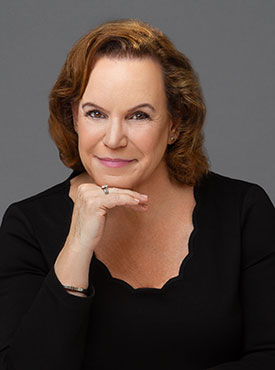
On the other hand, she understands that it isn’t easy for everyone to integrate the new expectations. “It’s pretty hard, especially in subcultures where a hug is considered a normative sign of warmth.”
Even with all the new investment and initiatives to address #MeToo-related issues in the Jewish world, the work is only just beginning.
“As a whole community, we’re probably 30 percent of the way there to changing culture, and 70 percent of the organizations are trying to get their people trained and better policies established,” said Black. “They are doing it with good hearts, in ethical and considered ways.”
What has not changed enough is that “on the funding side, the five or six or eight organizations that originally put money into this are still the same. No one else seems to be getting on board,” said Black. “That can and should change. Everyone in our community should be concerned about this, and the silence is deafening.”
Said Hadassah’s Sirbu, “This is major culture change we’re looking for, and it won’t happen in a couple of months. It will take years.”
For people like Lisa Goldman, who is still reeling from her own experiences of sexual assault and harassment, the change will come both in how the abusers are treated and in how society transforms.
Goldman isn’t interested in Cohen’s remorse, she said, but wants to make sure that he doesn’t rehabilitate his image and start working again in the field in which he enjoyed great stature.
“Since the beginning of the #MeToo movement and the Harvey Weinstein story, there’s been a lot of rage about stuff we’ve been sucking up for years,” she said. Goldman also echoed what many women who have experienced harassment and abuse say is most important now: “Change the system. Just make it not so hard for women.”
Debra Nussbaum Cohen is an award-winning journalist based in New York City. She is a columnist for the Jewish Journal in Los Angeles and the Jewish-giving maven at Inside Philanthropy.
ALSO READ: “When Rabbis Say #MeToo” and “#GamAni: The #MeToo’s Impact in Israel”








 Facebook
Facebook Instagram
Instagram Twitter
Twitter
Miriam Isserow says
This great article is marred by the quote that alleges that the #metoo pendulum has swung too far based on an anecdote about one man who was allegedly falsely accused. Given the important work that is being done by the various organizations, this interpolation is not only baseless but irrelevant editorializing. The author also missed another important actor on the scene, the grassroots #gamani fb group which is where many cases, such as Keren McGinity’s, have first been disclosed. I am an administrator of the group and know that it is a valuable resource to many people.
Debra Nussbaum Cohen says
GamAni is mentioned in the article, Miriam. Perhaps you did not read the article closely?
And there are real ramifications to the pendulum swinging perhaps a bit far — male executives not wanting to mentor newer women, for example. There is a real and documented backlash, unfortunately, which does not undermine the important work all of the many (MANY) listed organizations and individuals are doing. But it should be noted, as I do here.
Miriam Isserow says
I’ve had time to think since I 1st commented and heard from others. I wish I had not said the article was great. The subject is a great one but many opportunities were missed and even possibly misrepresented.
Elly says
Hi. My father was an attorney in our neighborhood and I do not think that there was sexual abuse but he was a violent wife and child abuser and an alcoholic. After decades of research I developed a program that can help anyone overcome some of these in a flaws that we may have in our nature but that the tree of life shows how to improve. It’s called http://www.healingwordsfromthetreeoflife.com. thanks
Debra Kohn says
In Israel, no mention was made of NA’AMAT Israel. They have done extensive campaigns throughout the country on sexual abuse, the
#metoo movement and legal representation for women.
Janet Ruth Heller says
I am glad that Hadassah Magazine is devoting space to the important topic of sexual harassment. However, I am disappointed that this article completely ignores any sexual harassment that is not employee and workplace harassment. Synagogues often provide spaces where harassers can abuse worshippers and individuals who attend programs and other events. These harassers may be members of the synagogue. Jewish patriarchal structures make it very hard for a woman to get her abuser evicted from the synagogue. Also, Hadassah allows men who harass Jewish women to be associate members. There needs to be a procedure to evict such men from Hadassah. I would like to write an article for Hadassah Magazine that covers Jewish sexual harassment outside of the workplace dimension.